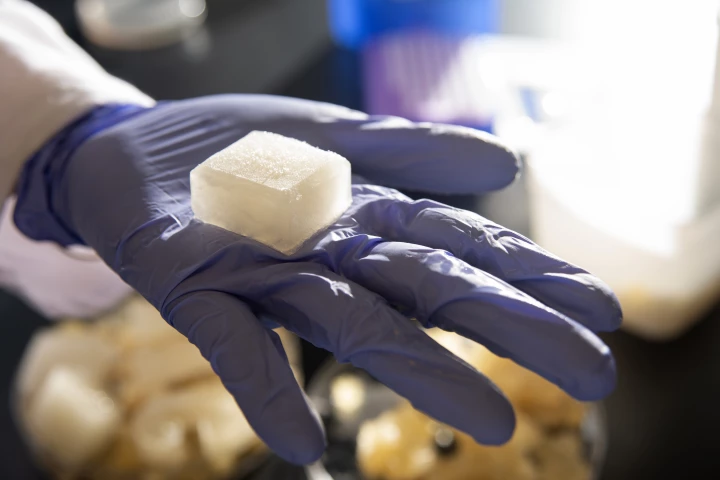UC Davis
-
Spawning in captivity can be hard on abalone, as aquaculture operators have to periodically yank the molluscs off the insides of their tanks to inspect their gonads. Things could soon get kinder and gentler, however, thanks to the use of ultrasound.
-
The DNA mutations that drive evolution are generally thought to be random, but a new study suggests otherwise. Comparing the genomes of plants grown in a lab, scientists found mutations are far less likely to occur in genes essential for survival.
-
When it comes to keeping things cold, ice cubes are hard to beat … although the things do melt. Scientists have set about addressing that limitation, with reusable water-based "jelly ice cubes" that hold their shape at all temperatures.
-
It may seem like a basic color, but blue is actually rather rare in the natural world. That complicates the search for natural blue food colorings, but now a team of scientists has found a promising candidate hiding in red cabbage.
-
Cattle are a major source of greenhouse gas emissions, mainly due to their methane-loaded burps. A detailed new study has found more evidence that feeding cows a small seaweed supplement can greatly reduce their methane emissions.
-
In April 2020, a bull calf named Cosmo was born to a team of scientists. This probably wouldn’t normally be news except that this particular bouncing baby boy had his genome edited as an embryo, to make him more likely to produce male offspring.
-
A new method for determining the sex of human remains based on proteins extracted from tooth enamel has proven more reliable than those based on DNA or bone anatomy.
-
A study from scientists at the University of California, Davis, has found unpasteurized milk, commonly known as raw milk, holds large volumes of antimicrobial-resistant genes which can swiftly spawn dangerous bacteria when left at room temperature.
-
Many readers are likely already familiar with the oximeters that measure blood oxygen levels via the patient's finger. Well, scientists have now developed a device that works on the same principle, but it can be non-invasively used on unborn fetuses.
-
Presently, in order to check the level of opioid drugs in a person's bloodstream, a blood sample must be taken. Things may soon be getting much less invasive, however, as scientists have now developed a breath test that does the job.
-
Archaeologists have found ancient tools at a dig site in Mongolia, indicating that humans were on the scene about 45,000 years ago, which is much earlier than current evidence suggests. There’s also a chance that the site is one spot where our ancestors mingled with the mysterious Denisovans.
-
Our bodies aren't great at regeneration. Other creatures have mastered this skill though, and now scientists at the University of California Davis (UC Davis) and Harvard have sequenced the RNA transcripts for the immortal hydra and figured out how it manages to do just that.
Load More











